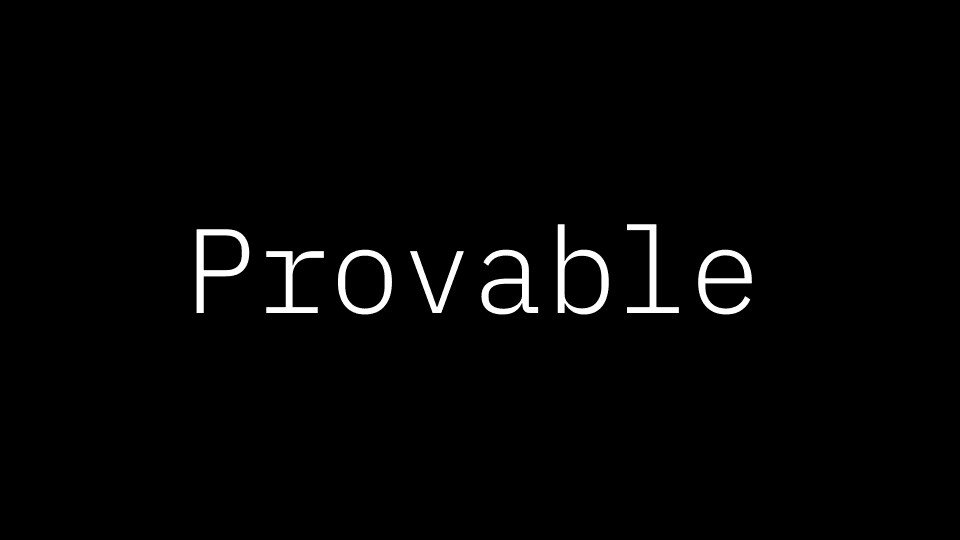Provable is the first platform to offer fully private applications.
Provable achieves this by leveraging decentralized systems and zero-knowledge cryptography to protect user data on the web. At its core, Provable offers users and application developers unbounded compute with absolute privacy.
By architecting Provable as a platform that is private-by-default, open-source, and built for the web, we believe Provable is uniquely positioned to address the shortcomings of blockchain adoption. With Provable, users have access to a world of truly personalized web services without giving up control of their private data.
We believe Provable will reshape the role decentralized systems play in our society and introduce new experiences never before seen on the web.
The challenge of ecosystem adoption.
For most, blockchains are just a concept. They are “used” by a small proportion of technologists, activists, and speculators. While most blockchains are permissionless, it does not mean they are accessible to all, as the concepts and terminology introduce real barriers. Many call this an onboarding problem. It’s a lot more fundamental than that.
First, existing blockchains are inadequate for real-world applications.
For example, the notion of building programs on Ethereum remains flawed. Without privacy, these applications cannot fully protect user activity. It simply does not work. For companies, the benefits of running business logic and data on a globally consistent platform are compelling. Yet the lack of privacy is a fundamental barrier to complying with operational guidelines. To achieve real-world adoption, we need blockchains that are private by default.
Second, technologies should not be developed for their own sake.
To us, a technology is worth its development when it solves a real world problem. Instead, many blockchains are built as solutions in search of problems. We believe you have to start from the user experience and work backwards to the technology. The best technologies are easy - even joyful - to use, and make the world better.
Third, new technologies attract actors who complicate a technology’s value proposition.
We see it in many ecosystems, including ours. For example, the recent advent of closed-source scalability engines has been a second wave to the initial era of “permissioned blockchains”. It goes without saying that vendor lock-in is rarely a good thing, especially as it pertains to “trustless” solutions. But by building a technology controlled entirely by one company and available only from one company, it is, by definition, a “trusted” solution. To show the value proposition for a new technology, the solution should be open-source and permissionless.
The next step for the web.
In the next decade, web services will evolve to become truly personal, living in more places than just your browser, and reason over every intimate detail of our personal lives. There are examples to demonstrate this already. For example, in the past five years, the number of in-home smart assistants has grown from zero to half a billion web-connected devices. Our private lives have become a public commodity and as web services evolve to become more personal, we need to rethink how we control our data.
Today, there is no such thing as private web data.
If it lives online, somebody else owns it. The business model of the web is to provide free services in exchange for personal data. This model is antiquated and puts users at odds with providers. The user is forced to give up their data in exchange for services they want, at the cost of personal privacy. The provider bears the risks for managing user data to provide their service, facing the implications of storing, processing, and reporting it. It does not have to be this way and it should not be this way.
Users should not have to hand over their private data.
Instead, users should be able to run their data on transparent algorithms from the provider. And providers should not need to store, process, or report user data. Instead, they should be able to offload their work to the user and merely verify a response. By providing services this way, neither the user nor the provider learns more than they should, and the control over personal data remains with the user.
As the existing web is a subset of this model, users are able to use the concepts they already know from the web to interact on Provable. And by introducing private applications as a new layer to the web, providers are able to offer new experiences to users without replacing their stack.
Introducing Provable.
Provable is built for the web.
Unlike existing solutions that seek to replace it, Provable is designed to integrate with it. For users, Provable introduces new experiences that are both truly personal and truly private. And for developers, Provable introduces a programming model that integrates with existing web applications.
In the coming days, we are releasing Developer Preview I.
To write private applications on Provable intuitively and easily, we are developing a programming language called Leo. Leo looks and feels just like a traditional programming language. Yet under the hood, Leo is far more complex. Leo abstracts low-level cryptographic concepts and makes it easy to integrate private applications into your stack.
This is just the first of many steps to building Provable, and we want developers to try it.
We want to make Leo a new standard for writing private applications on the web, and believe that by providing the best toolkit and infrastructure for it, that application developers will help us integrate the technology and make private applications a part of every users’ web experience. Because, private data should be just that - private.
